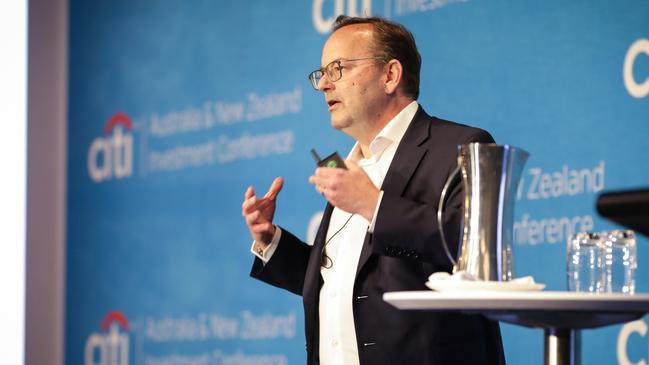Fed comments unlikely to give shares impetus, says Citi analyst Jim McCormick
The Federal Reserve’s comments that the jump in bond yields has reduced the need for rate rises have helped stocks but Citi strategist Jim McCormick doesn’t expect shares to surge.

The US Federal Reserve’s comments suggesting the jump in bond yields has lessened the need for rate hikes have provided further support for shares despite increased geopolitical risk from the Israel-Hamas war.
But strategist Jim McCormick doesn’t expect shares to make much headway. The London-based head of macro research at Citi tells investors not to overplay the significance of this week’s comments from Fed officials including vice-chairman Philip Jefferson on bond yields.
After breaking above its 2022 high near 4.3 per cent after Fed officials revised up their Fed funds rate projections in September, the US 10-year bond yield hit a 16-year high of 4.89 per cent after a stronger than expected US jobs report. But the shift in tone from officials this week helped lower the US 10-year yield to 4.65 per cent, leading to a further solid rebound in sharemarkets.
Fed officials may be drawing a line in the sand near 5 per cent on the US 10-year yield after the crucial “risk-free rate” surged about 100 basis points in the past two months, but Mr McCormick feels 10-year yields in the 4-5 per cent area will be a headwind for US sharemarket valuations.
The US sharemarket is nowhere near the extremely expensive valuations relative to bonds that prevailed before the 1987 crash, but the fact “safe” US government bonds have become a lot more attractive relative to shares is yet to be reflected in asset allocations. “So I’m not kind of pounding the table that we should be very negative on equities, but I’m more cautious today than I have been anytime this year,” Mr McCormick says.
“I’m in the camp that … forget about where you think you are in the cycle … ultimately, post pandemic, if you’re talking about a world of 10-year Treasuries (yield) in the 4 to 5 per cent range on a sustained basis, then multiples (share prices relative to earnings per share) need to come down.” He worries that the level of tightening in financial conditions that is implied by the rise in 10-year real yields is significant enough to create “orange flags” for equities.
US inflation data for September are due on Thursday. Core CPI is expected to slip from 4.3 per cent to 4.1 per cent year-on-year, still well above the Fed’s 2 per cent target for inflation. Mr McCormick says one of the problems with the transfer of US monetary policy to the real economy this cycle has been that the yield curve has been deeply inverted.

“So what the Fed is saying now is both right and obvious, and in some ways the market is making a mountain out of a molehill in the sense that before this week, even after the jobs data, I think the curve was pricing another 12 basis points of rate hikes after 500 plus basis points of tightening.”
In that context, it doesn’t really matter whether the Fed goes on hold or increases another 25 points.
“What the market has done for the Fed is to make them more comfortable that they can message yet another pause, but they’re not about to start cutting rates anytime soon,” Mr McCormick says.
The market was “looking for a little bit of good news” after a tumultuous September.
“I’m not making too much about what the Fed is saying, but when it finally confirms ‘we do think we’re done and this move in bond yields has helped us’ – the market is going to like that.
“But I don’t think it’s a game changer that will restart a big move higher in equities.”
More important will be the US inflation data this week.
Mr McCormick’s analysis suggests the core CPI is going to stabilise around 3 per cent, leading to a sustained period of relatively high US interest rates rather than rate cuts, barring a recession.
“The structural level of inflation is higher than it was pre-pandemic, so the monetary policy required to get us back below 2 per cent is not going to be something that central banks will want to do.
“Let’s call it the proverbial implicit shift in the target … you don’t have to formally shift the target, you can say, ‘We’re still committed to 2 per cent, but it’s better to achieve it in two years rather than one.’ ”
Still, central banks are a “long way” from making explicit changes in their inflation targets.
Mr McCormick says “one of the greatest mistakes of the post-pandemic period has been the recency bias” issue.
“We’re all sort of conditioned around a world of 2010-2020 that, ultimately, is not the world that exists any more,” he says.
“What’s happened is, in the fixed income market and the yield curve, is that every time you shock the front end a little bit higher, the expectation was that the growth decline was going to be bigger.
“Part of the last three months’ rise in bond yields is this kind of final recognition that economies are performing much better at levels of interest rates that were unthinkable a few years ago.
“Part of that is just timing and the fact that Americans don’t do floating rate mortgages any more.
“But you have to realise that nominal GDP is much higher than we’ve been used to.”




To join the conversation, please log in. Don't have an account? Register
Join the conversation, you are commenting as Logout